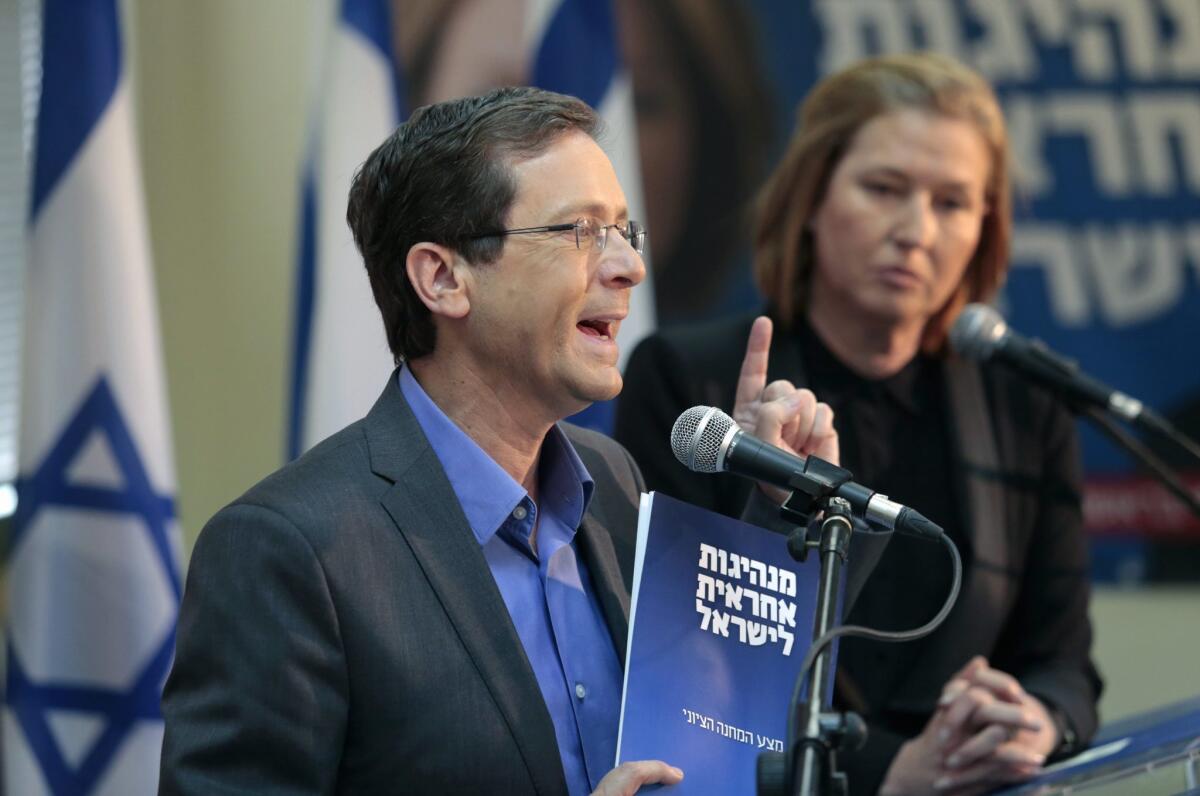Op-Ed: Opposition to Iran deal makes for some strange bedfellows

Isaac Herzog, leader of Israel’s opposition party and a major rival of Prime Minister Benjamin Netanyahu, has spoken out against the Iran deal.
- Share via
Tel Aviv — Here’s a pop quiz about the six-nation nuclear pact with Iran, signed last week: Which Israeli official called it a “horrible deal, one that will go down as the tragedy of the ages”?
If you guessed Prime Minister Benjamin Netanyahu, you’re wrong. The correct answer is opposition leader Isaac Herzog, Netanyahu’s chief political rival. “With regard to security, I am more extreme than Netanyahu,” Herzog said.
Indeed, the Iran deal has managed to unite, however briefly, the country’s fractious political class. Other critics of the deal include Tzipi Livni, who served as Netanyahu’s justice minister before breaking with the premier to join a center-left coalition, and Avigdor Lieberman, leader of the ultranationalist Yisrael Beiteinu party, who condemned the pact as “total capitulation to unrestrained terrorism.”
To an American, the most surprising opposition is on the left. For the last few days I’ve been meeting with liberal politicians and academics as part of a visiting delegation of American professors. Almost all of our hosts told us they detested Netanyahu and the Iran deal.
That’s probably not a story you’ve heard in the United States, where we tend to superimpose our political categories on everyone else. For American supporters of the Iran pact, especially, it’s tempting to imagine that Israeli reactions broke down pretty much like our own: conservatives condemned the nuclear deal while liberals rallied behind it.
The myth was reinforced by the American news media, which quoted tart attacks on the Iran pact by Netanyahu and his ministers — “a historic mistake for the world,” “a capitulation of historic proportions” and so on — but generally omitted his opponents’ equally barbed comments against the deal.
Instead they quoted President Obama, who phoned Netanyahu to reassure him about America’s “stalwart commitment to Israel’s security.” Obama also told the Israeli premier that the nuclear agreement “will not diminish [America’s] concerns regarding Iran’s support for terrorism and threats toward Israel,” according to a White House statement.
Netanyahu isn’t buying that. Neither are most Israelis from across the ideological spectrum, who fear that the Iran agreement gives legitimacy to the chief sponsor of terrorism in the Middle East. Iran has been the main ally of Bashar Assad in his murderous campaign against Syrian rebels, which has already claimed an estimated 200,000 lives. It has also, of course, endorsed the creation of a Palestinian state and supported militants in Gaza.
And yet — here’s the strangest part — most Palestinians oppose the nuclear deal too. According to a poll conducted last month by the Palestinian Center for Policy and Survey Research, only 25% of Palestinians in the West Bank and Gaza thought the framework for the pact would be “good for the Arabs.”
That finding may reflect the complicated relationship between Iran and Hamas, under strain since 2013, when Hamas backed the Syrian rebels against Assad. At its root, however, Palestinian skepticism about the nuclear agreement reflects a growing concern in the Arab world about Iran’s destabilizing influence. From Syria and Iraq to Yemen and Afghanistan, Iran’s armed proxies have unleashed mayhem. By freeing Iran from economic sanctions, its enemies fear, the nuclear pact will free it to foment yet more violence and unrest.
Ironically, then, the Iran deal hasn’t simply united Israel’s political parties; it has also brought Israel into accord with most of its Arab neighbors, who have their own reasons for disliking what could be Obama’s signature foreign policy achievement. That doesn’t mean such skepticism is warranted or that the U.S. should back off the Iran pact; it does mean regional support will be hard to come by.
Over the next two months, Republicans and Democrats will debate whether the Iran deal is a good one, or at least better than bad alternatives. Here in Israel, the only real debate will be over how to manage a situation that almost nobody likes.
Jonathan Zimmerman is a professor of history and education at New York University. He is the author of “Too Hot to Handle: A Global History of Sex Education.”
Follow the Opinion section on Twitter @latimesopinion and Facebook
More to Read
A cure for the common opinion
Get thought-provoking perspectives with our weekly newsletter.
You may occasionally receive promotional content from the Los Angeles Times.






